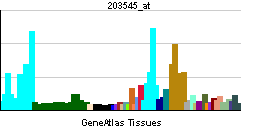ALG8
| Asparagine-linked glycosylation 8 homolog (S. cerevisiae, alpha-1,3-glucosyltransferase) | |||||||||||
|---|---|---|---|---|---|---|---|---|---|---|---|
| Identifiers | |||||||||||
| Symbols | ALG8 ; MGC2840 | ||||||||||
| External IDs | Template:OMIM5 Template:MGI HomoloGene: 6931 | ||||||||||
| |||||||||||
| RNA expression pattern | |||||||||||
 | |||||||||||
| More reference expression data | |||||||||||
| Orthologs | |||||||||||
| Template:GNF Ortholog box | |||||||||||
| Species | Human | Mouse | |||||||||
| Entrez | n/a | n/a | |||||||||
| Ensembl | n/a | n/a | |||||||||
| UniProt | n/a | n/a | |||||||||
| RefSeq (mRNA) | n/a | n/a | |||||||||
| RefSeq (protein) | n/a | n/a | |||||||||
| Location (UCSC) | n/a | n/a | |||||||||
| PubMed search | n/a | n/a | |||||||||
Asparagine-linked glycosylation 8 homolog (S. cerevisiae, alpha-1,3-glucosyltransferase), also known as ALG8, is a human gene.[1]
This gene encodes a member of the ALG6/ALG8 glucosyltransferase family. The encoded protein catalyzes the addition of the second glucose residue to the lipid-linked oligosaccharide precursor for N-linked glycosylation of proteins. Mutations in this gene have been associated with congenital disorder of glycosylation type Ih (CDG-Ih). Alternatively spliced transcript variants encoding different isoforms have been identified.[1]
References
Further reading
- Jaeken J (2005). "Congenital disorders of glycosylation (CDG): update and new developments". J. Inherit. Metab. Dis. 27 (3): 423–6. PMID 15272470.
- Jaeken J, Carchon H (2004). "Congenital disorders of glycosylation: a booming chapter of pediatrics". Curr. Opin. Pediatr. 16 (4): 434–9. PMID 15273506.
- Adams MD, Kerlavage AR, Fleischmann RD; et al. (1995). "Initial assessment of human gene diversity and expression patterns based upon 83 million nucleotides of cDNA sequence". Nature. 377 (6547 Suppl): 3–174. PMID 7566098.
- Stanchi F, Bertocco E, Toppo S; et al. (2001). "Characterization of 16 novel human genes showing high similarity to yeast sequences". Yeast. 18 (1): 69–80. doi:10.1002/1097-0061(200101)18:1<69::AID-YEA647>3.0.CO;2-H. PMID 11124703.
- Oriol R, Martinez-Duncker I, Chantret I; et al. (2003). "Common origin and evolution of glycosyltransferases using Dol-P-monosaccharides as donor substrate". Mol. Biol. Evol. 19 (9): 1451–63. PMID 12200473.
- Strausberg RL, Feingold EA, Grouse LH; et al. (2003). "Generation and initial analysis of more than 15,000 full-length human and mouse cDNA sequences". Proc. Natl. Acad. Sci. U.S.A. 99 (26): 16899–903. doi:10.1073/pnas.242603899. PMID 12477932.
- Chantret I, Dancourt J, Dupré T; et al. (2003). "A deficiency in dolichyl-P-glucose:Glc1Man9GlcNAc2-PP-dolichyl alpha3-glucosyltransferase defines a new subtype of congenital disorders of glycosylation". J. Biol. Chem. 278 (11): 9962–71. doi:10.1074/jbc.M211950200. PMID 12480927.
- Ota T, Suzuki Y, Nishikawa T; et al. (2004). "Complete sequencing and characterization of 21,243 full-length human cDNAs". Nat. Genet. 36 (1): 40–5. doi:10.1038/ng1285. PMID 14702039.
- Schollen E, Frank CG, Keldermans L; et al. (2004). "Clinical and molecular features of three patients with congenital disorders of glycosylation type Ih (CDG-Ih) (ALG8 deficiency)". J. Med. Genet. 41 (7): 550–6. PMID 15235028.
- Gerhard DS, Wagner L, Feingold EA; et al. (2004). "The status, quality, and expansion of the NIH full-length cDNA project: the Mammalian Gene Collection (MGC)". Genome Res. 14 (10B): 2121–7. doi:10.1101/gr.2596504. PMID 15489334.
- Otsuki T, Ota T, Nishikawa T; et al. (2007). "Signal sequence and keyword trap in silico for selection of full-length human cDNAs encoding secretion or membrane proteins from oligo-capped cDNA libraries". DNA Res. 12 (2): 117–26. doi:10.1093/dnares/12.2.117. PMID 16303743.
- Kimura K, Wakamatsu A, Suzuki Y; et al. (2006). "Diversification of transcriptional modulation: large-scale identification and characterization of putative alternative promoters of human genes". Genome Res. 16 (1): 55–65. doi:10.1101/gr.4039406. PMID 16344560.
| This protein-related article is a stub. You can help Wikipedia by expanding it. |